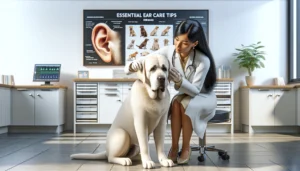Living in a city can be difficult for dog owners, as it can be difficult to find green spaces for exercise and navigate busy streets. Even with these issues, city life can still be fun and rewarding for dogs, as long as their owners take care of their unique needs.
Table of Contents
ToggleUnderstanding Urban Challenges for Dogs
Dogs that live in cities have a different lifestyle than dogs that live in suburbs or rural areas. Dense environments, busy streets, and limited nature reserves can affect their health and behavior. Recognizing these problems is the first thing you can do to help your dog live a happy life in the city.
1. Walking through noisy, busy streets
The streets of the city are full of noise and people doing different things. Dogs have to deal with sounds such as traffic and construction work, which can make them anxious or stressed. Using positive feedback and slow exposure to city sounds to teach your dog to stay calm and collected amid the chaos of the city can help him adapt and feel more secure.
2. Ability to play sports and visit green spaces
Exercise is very important for your dog’s physical and mental health. Backyards are not common in cities, so it can be difficult to find a place for your dog to run and play. Regular trips to dog parks, city trails, and even the beach can help your dog stay healthy and keep his mind sharp. In addition to outdoor activities, your dog can also play and exercise indoors, keeping him or her busy no matter where he or she lives.
3. Concerns about air quality and pollution
People who live in cities have to worry about pollution, which can damage your dog’s lungs. Installing an air purifier in your home and choosing walks with less traffic can help reduce your exposure to polluted air. Another important way to protect yourself is to pay close attention to air quality and stay indoors when pollution is high.
4. Food choices and nutrition in cities
If you live in the city, it can be more difficult to find fresh and different dog food. But in many cities, you will find specialized pet stores and online delivery services that sell healthy, high-quality dog food. By talking to your vet about dietary adjustments, you can ensure your dog gets all the nutrients he needs to live a healthy life.
5. Take care of animals and dangers in the city
One of the benefits of living in a city is that veterinary services are close by, making both normal and emergency care easily accessible. It is important to be aware of urban hazards such as traffic, toxic chemicals, and possible threats from wild or stray animals. You can reduce these risks by keeping your dog on a leash, watching where he goes, and making sure all his photos are up to date.
6. Make friends and teach good behavior
In the city, you need to make sure your dog is well-socialized. Being around different types of people, animals, and environments can help you become less anxious and angry. Using a behavioral training program, dogs can learn to navigate busy, noisy cities. This makes traveling more fun and less stressful.
7. Thoughts about heat and weather
Urban landscapes can make the weather worse, especially in hot weather. Heating concrete and asphalt quickly can damage your dog’s paws. You can prevent your dog from getting sick or feeling uncomfortable in the heat by scheduling walks at cooler times of the day, dressing his paws safely, and making sure he stays hydrated.
8. Indoor living and space management
To meet your dog’s needs, you must carefully organize the small living spaces that are popular in the city. Giving your dog a special place with a bed, toys, and a water bowl can help him feel safe. To avoid boredom and scrambling in a small space, regular exercise and mental stimulation are important.
9. Support and community groups
Cities tend to have many dog owners and pet services. Networking with other pet owners can help you and provide social opportunities for your dog. Pet daycare, pet sitters, and dog walkers are all useful services that can help you care for your pets, especially if you live in a busy city.
10. Legal Responsibilities and Urban Etiquette
If you live in a city, it is important to know and follow the rules regarding pets. This includes rules about leashing, removing litter, and noise control. If you are a responsible and kind pet owner, you can ensure that your dog and others around you get along peacefully.
Conclusion
Taking care of a dog in the city has its difficulties, but it also brings opportunities to learn new things and meet new people. Dog owners can ensure their pets live happy and healthy urban lives by understanding and meeting their pets’ unique needs. With the right attitude, city life can be fun for both dogs and their owners, building strong bonds and mutual respect.
FAQs
1. How can I help my dog cope with city noise?
Slowly exposing yourself to city sounds using positive reinforcement and relaxation methods can help your dog become less sensitive to noise. It can also help to play recorded city sounds at a low volume and slowly increase the volume over time.
2. Which sports are best suited for dogs living in cities?
Dogs who live in the city should go for regular walks, go to dog parks, and play indoor games such as tug-of-war or fetch. To keep them mentally and physically occupied, you can give them agility exercises or give them toys to play with.
3. What impact does urban pollution have on dogs, and how can we ensure their safety?
Dogs can develop breathing problems and allergies from city air. To keep them safe, avoid walking during rush hour, stick to less polluted roads, and consider installing an air purifier for your home.
4. Should dogs living in cities watch their diet?
Living in a city may not change your nutritional needs, but it can make it harder to get high-quality fresh food. Choose a high-quality commercial diet and discuss your dog’s specific needs with your vet, especially if he has health problems.
5. If I live in a city, how often should I take my dog to the vet?
Dogs living in cities should be checked every six months, but older dogs, puppies, or dogs with long-term health problems may need checks more often. Start by talking to your vet to find out which plan is best for your pet.
6. How can I ensure that my dog adapts well to city life?
Introduce your dog to different people, animals, and places in a controlled and good way. Going to dog parks, walking around town, and taking regular training classes can help your dog get used to the company of people and other dogs.


